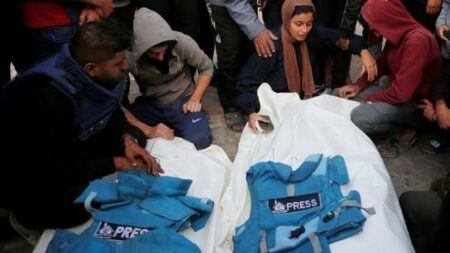Palestinian Territory- EuroMed Human Rights Monitor: June 15, 2023: Since the start of its genocidal war in the Gaza Strip on 7 October 2023, Israel has made Palestinian journalists one of its primary targets and committed numerous crimes against them.
These grave crimes and violations against journalists contravene international law, the rules of war, and the duty to protect journalists and not impede their pursuit of truth and accurate representation of the reality on the ground.
Palestinian journalists face intimidation and a range of brutalities intended to deter them from carrying out their work, including planned and targeted killings, arbitrary detentions, forced disappearances (during which they are often accompanied by their families), destruction of their workplaces, denial of access to equipment needed for their jobs, and outright threats.
Since the start of its genocide in the Gaza Strip, Israel has killed approximately 150 Palestinian journalists. These journalists have been targeted while wearing their press jackets, working in the field, inside their offices, in press tents erected next to hospitals for media coverage, or with their families in their homes, which Israel has destroyed over their heads.
During the Israeli army’s ground operation, journalists have also been subjected to arbitrary arrest, crimes of torture, and inhumane treatment. Some of these journalists were released, but others remain under arrest and remain forcibly disappeared; their fate remains unknown, as they have been denied legal representation and are being treated inhumanely. These journalists include Nidal Al-Wahidi, Haitham Abdel-Wahed, Imad Al-Efrangi, Ahmed Abdel-Aland his brother Khader Abdel-Al, and others.
Dozens of journalists have also been injured in Israeli air and artillery attacks or by direct gunfire. Some of them sustained severe injuries, while others had to have their limbs amputated. At the same time, Israel’s military has deliberately destroyed the vast majority of press headquarters, either partially or entirely, forcing them out of service, while the broadcasting systems of most of Gaza’s 24 radio stations have been disrupted by ongoing bombing and/or fuel shortages.
Together with the systematic Israeli targeting of Palestinian journalists in the Gaza Strip, there is also public incitement by Israeli ministers, officials, and official Israeli social media accounts, through the publication of reports that question specific journalists’ objectivity and integrity and/or falsely accuse them of being members of Palestinian factions without any evidence. They also claimed to have known in advance about the military operation that some Palestinian factions launched in the Gaza envelope area on 7 October.
In an effort to stop them from performing their work, the Israeli army has been directly threatening journalists in different ways.
Furthermore, Israel has imposed tight restrictions on TV channels that operate in the Occupied Palestinian Territory over their press coverage; this includes the closure of Al Mayadeen Media Network and Al Jazeera Network’s operations in Palestine.
Just days ago, photojournalist Mahmoud Barjas Shalha received a call from a private number. When he answered, the caller told him in halting Arabic that he was from the Israeli army and that Shalha should “stop filming completely”. He then proceeded to hurl vulgar insults at him before hanging up the phone without allowing Shalhato finish his sentence.
Israel has also persisted in barring journalists and members of foreign media from entering the Gaza Strip since the start of its ongoing military assault, with the exception of a small number of individuals who have been permitted to accompany Israeli military forces on their ground operations and are subject to strict restrictions, such as remaining only in certain areas authorised by Israeli forces.
Under UN Security Council Resolutions 2015/2222 and 2006/1738, which denounce international attacks on journalists and media workers in times of armed conflict, targeting journalists is considered to be a war crime and a violation of international law. Additionally, the 1977 Geneva Conventions’ Additional Appendix (Protocol) I, Article 79, emphasises the need to safeguard journalists who work in areas of armed conflict by treating them as civilians.
In addition to launching a thorough international investigation into the crimes and violations the Israeli army has committed against journalists in the Gaza Strip, the international community must act promptly to hold all perpetrators accountable and compensate the victims.
Pressure should be applied to Israel to stop the deliberate killing and direct targeting of journalists, to safeguard their work, to allow them to convey the truth and carry out their messages, and to permit foreign news agency crews and journalists to enter and work in the Strip without hindrance as long as their safety is guaranteed.
Direct and indiscriminate attacks against civilians are strictly forbidden by international criminal law and humanitarian law, which classifies such attacks as war crimes. When such attacks are carried out as a component of a larger, coordinated assault against a civilian population—as is currently occurring in the Gaza Strip—they are also classified as crimes against humanity.
Euro-Med Human Rights Monitor emphasizes that these assaults are a component of the crime of genocide that Israel has been committing against Gaza Strip inhabitants since 7 October.

